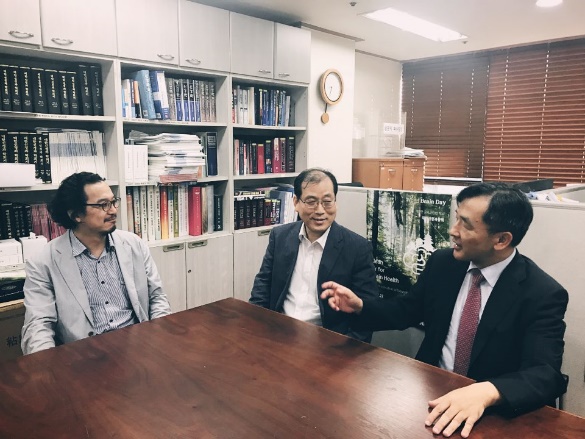16th AOCN meet discusses various programs to be presented at renowned neurology congress
The Asian Oceanian Congress of Neurology will kick off November in Seoul with more than 1,000 physicians from all around the world attending for a rejuvenating informative session on all subfields of neurology.
The conference, which will host a variety of speakers on numerous subjects, ranging from disease areas of stroke, dementia, and Parkinson disease, among many others, will provide physicians an opportunity to refresh their knowledge on fields outside their expertise while learning more about their own, its chief organizer says.
Co-hosted by the Asian Oceanian Association of Neurology (AOAN) and the Korean Neurology Association (KNA), the biennial 16th AOCN conference aims to be the most successful event as of yet.
Korea Biomedical Review met with key members of the 16th AOCN committee, including the Congress Chair and KNA President Kim Jong-sung, and Local Scientific Committee Chair and previous KNA President Kim Seung-min to find out what’s in store.

KBR: What is the department of neurology?
Kim Seung-min: The field originated from branching out of the previous department of neuropsychiatry. The field of neurology takes a look at diseases such as stroke, dementia, and Parkinson disease, which are prevalent in the elderly. In a rapidly aging society, the area has become increasingly important. The Korean Neurology Association, founded in 1982 and boasting more than 30 years of history, looks at neurological diseases that can be treated through medication, including stroke, epilepsy, peripheral nerve disease, headache, dizziness, Parkinson disease and dementia.
KBR: What is the purpose of the AOCN?
Kim Jong-sung: Diseases in the field of neurology and their treatment methods differ from country to country. The conference aims to gather physicians from across the continent to share information on the latest trends. We have small but developed nations such as Japan, Australia, and Korea. We also have developing countries in the Southeast Asian nations. The academic levels differ among countries, but the conference will unite people from all places so physicians can learn from one another and teach one another in various fields.
KBR: What can participants take away from the gathering?
Kim Seung-min: The first objective of the conference is education. The second is to share broad knowledge. Third is to discuss controversial issues in the field. What we’ll do is talk about the most controversial topics in each field regarding diagnosis and treatment and hold debates and discussions around them. Rather than presenting excellent research material, we will focus on general neurology and have professionals from each country share information and knowledge. We believe that reinforcing and reeducating neurologists on general knowledge is innovation in itself.
Kim Jong-sung: Compared to the conferences held in the U.S. and Europe, the AOCN will have more participants from developing countries. As such, the conference may not result in the presentation of extraordinarily innovative or surprising research. Rather we will focus more on presentations that pertain specifically to this region. For example, the Asian region has more cases of hepatitis, malaria as well as different, specific types of stroke; epidemiology are also unique.
On these topics, physicians will present characteristics of Asian patients. Therefore, the conference will discuss issues that pertain to our region and discuss our treatment experience and possible methods rather than present innovative research.
Also, presenters and participants will discuss updated information on respective disease areas, which will be a boon for specialists in various fields. For instance, I specialize in strokes, and because of that, I do not know much about peripheral nerve disease as much as a specialist does. It works vice versa – a peripheral nerve disease specialist will not know about strokes in-depth. The conference offers an opportunity for specialists to relearn about different fields of neurology that they have neglected.
KBR: Can we expect any exciting presentations?
Kim Seung-min: Various organizations and committees will be simultaneously opening their respective sessions during the conference – making it a fantastic event. The Asian Regional Committee of Headache will open up as a session. The Korean Society of Neurodegenerative Disease will conjoin the conference. The KNA will also be going all in for the meeting so that we may not be able to open up its regular fall conference this year due to participating in the AOCN.
KBR: How did Korea come to host the Asian Oceanian Congress of Neurology in 2018?
Kim Jong-sung: There are several international neurology associations across the world, including the World Federation of Neurology, American Neurological Association, and the European Academy of Neurology. The Asian Oceanian Association of Neurology combines countries in Asia and Oceania. Korea first hosted the Asian Oceanian Congress of Neurology in 1996. As countries in the association take turns hosting the conference, the Asian Oceanian Association of Neurology and Korean Neurology Association has come to host the biennial conference again in more than 30 years. We expect it to have a high turnout and be an informative session for all participants.

